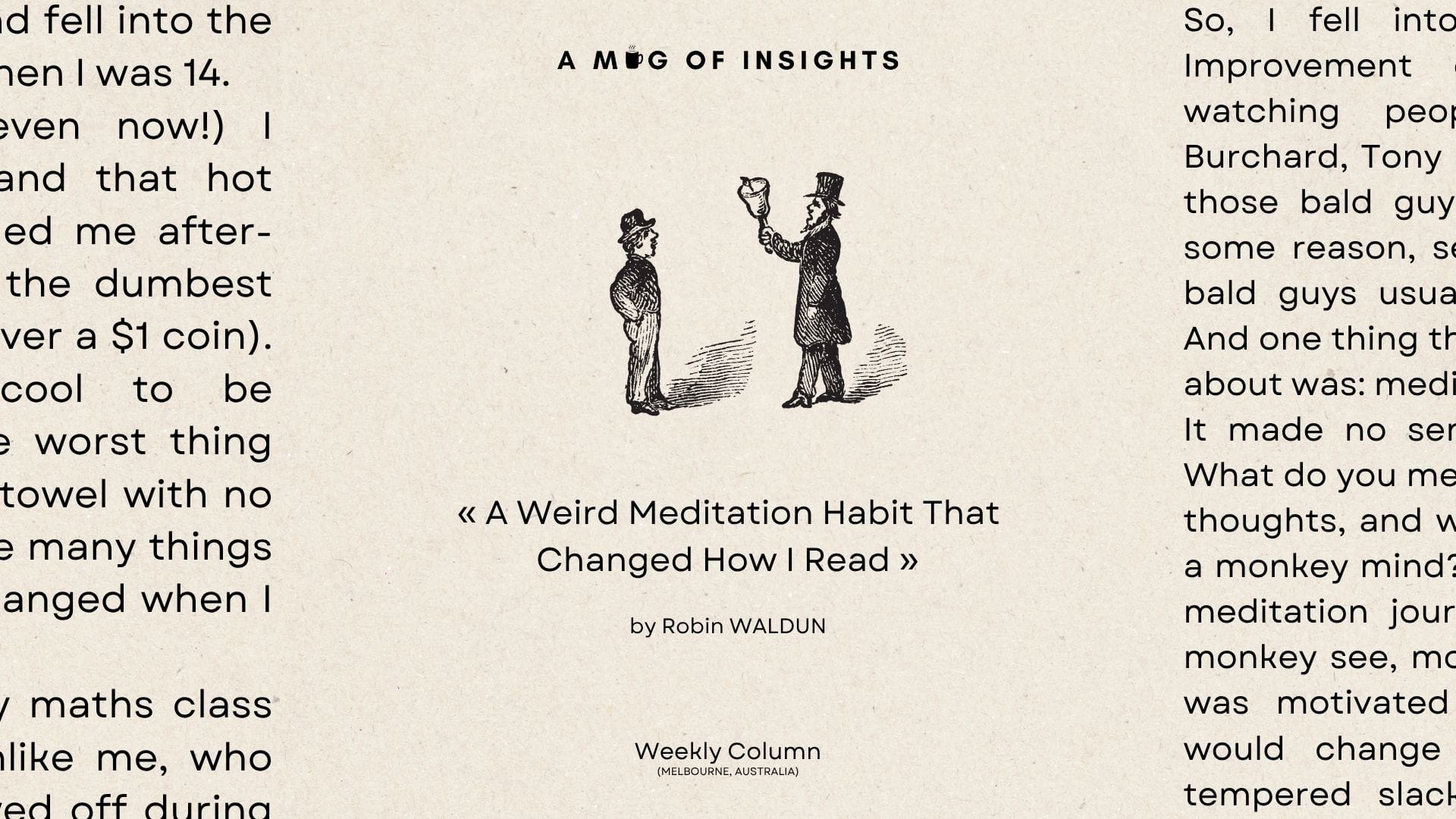A Weird Meditation Habit That Changed How I Read

Welcome to the weekly column from A Mug of Insights' new home! From now on, I'll dispatch these letters on Saturdays, and paid subscribers will receive their 1-2-Read letters on Mondays. If you like what you're reading, consider upgrading to the Grande tier for journal prompts and a practical exercise every week to strengthen your reading muscles! Thank you for reading, and I look forward to seeing you next week.
I grew up in the 2010s and fell into the meditation rabbit hole when I was 14.
As a teenager (and even now!) I struggled with anger, and that hot temper sometimes earned me after-school detentions over the dumbest things (one time it was over a $1 coin). Back then, it was cool to be confrontational, and the worst thing you could be was a wet towel with no boundaries. However, like many things in high school, this all changed when I caught feelings for a girl.
She was assigned to my maths class back in Year 10, and unlike me, who swore like a sailor, showed off during PE, and thought Maths was as boring as bird-watching, she was organised, teachers loved her, and she had High Distinctions for everything. I looked at my transcript with Credit and Satisfactory printed next to every subject and thought something had to change.
So, I fell into the 2010s Self-Improvement cult and started watching people like Brandon Burchard, Tony Robbins and one of those bald guys on YouTube (for some reason, self-help advice and bald guys usually come in pairs). And one thing they couldn’t shut up about was: meditation.
It made no sense to me at first. What do you mean by observing my thoughts, and what’s so bad about a monkey mind? But back then, my meditation journey was just that: monkey see, monkey do, because I was motivated by anything that would change me from a hot-tempered slack-off to a diligent student who could impress Miss Goody-two-shoes.
I started with 10 minutes a day and all kinds of crazy thoughts coursed through my brain: the geography teacher needs mouthwash, the business management teacher looks like a drunk, and why did the Science teacher leave with that English teacher after school? Also, I'd better straighten things out with Chris after school and tell Wade to stop hanging out with me because he’s a weirdo. Meditation wasn’t anything like those bald guys described, and it made my anger worse. I was forced to look at my thoughts, and I didn’t like what I saw.
But I continued this 10-minute-a-day clockwork for a year, and strange things started happening. I still got angry at Chris’s endless lunch money borrowing and Wade’s after-school sob stories, but I didn’t chew their heads off in the moment. And in Maths, I figured that if I paid attention, even bird watching could be interesting.
I didn’t know what changed exactly, but something was working. My grades started getting better, people were nicer to me, and I even made friends with teachers I used to hate. Finally, after a Maths test one afternoon, Miss Goody-two-shoes stopped me at the door: “How did you do?”
“Not too shabby,” I said.
“That’s good!” She smiled, and my heart skipped a beat, “Just letting you know, Ms. Taylor’s putting us up for the subject awards this year. Great work!” And I walked around like a happy drunk for the rest of the afternoon.
A decade later, Miss Goody-two-shoes became my best friend, and we went out for dinner with our partners on a double date. The four of us sat around a table at a Thai restaurant and eventually landed on the topic of trying to get back to reading after graduating. “I don’t know, after finishing Uni I just can’t find the will to sit down and read again.” She said.
“That’s funny. Where did Ms. Taylor’s pet student go?” I laughed.
“Ok, gee, Mr. I’ll Teach Everyone How to Read,” she said, and the whole table flared up in laughter, “I mean, you’re the one teaching this stuff for work. How do you manage to read so much even when you’re that busy?” Everyone turned their eyes my way.
I sat there and I couldn’t find an answer. A lot of people think I’m gifted with a long attention span, but in reality, my mind’s usually all over the map. I once got a detention in primary school because I found the construction work outside more interesting than Spelling Bees. Even now, I’ll take selling and buying BS on Facebook Marketplace over an hour of silent reading any day.
But one thing I kept returning to is my weird 10-minute-a-day habit that I’ve been doing on-and-off for a decade. Even though nothing concrete came out of it (I still don’t have that Mr. Miyagi aura), there is one thing I kept catching myself doing.
The best way to describe it is a delayed reaction. I learned to distrust my first instinct and left a gap in my mind before I acted, and it became so habitual that I no longer think about it. Some call it mindfulness to make themselves sound better, but I’m just going to call it my brain lag. And if I think about it, my reading habits have nothing to do with being able to sit still for hours, but a lot to do with leveraging this brain lag.
In most cases, the archenemy of reading isn’t a short attention span, but distractions. They will do everything to tempt you to stop reading. But as demanding as these little demons are, they’re window shoppers and won’t stick around for that long. For someone who doesn’t have much brain lag, they’ll treat this window shopper as an actual client: How can I help you? What do you need? Have a seat! And before they know it, they’re off scrolling on reels or looking up 19th-century coffins that have bells sticking out of them. But someone with a bit of brain lag is a seasoned retail manager: are you going to buy anything? What exactly are you looking for? We don’t have that, sorry. With a little bit of probing, a distraction will dart out of your mind before you act on it. This will usually buy you back a few minutes or even an hour if you use it right.
Here's the thing: distractions are perfectly ok and natural. A lot of anti-phone/anti-social media content tries to change your behaviour through guilt without giving you a conscious choice. So, next time when you’re distracted, invite the distraction into your mind, catch yourself thinking about opening Instagram, and then ask yourself: do I want a short dose of content? Or do I want to buy more time with this book? Give yourself a choice and don’t fight with your decision, because even just noticing the urge to get distracted is already 90% of the work done. If you practice this simple noticing over and over again (even if you give into the distraction), you’ll find that the urge to scroll will get weaker, and staying on the page will get easier.
And this is the basic lesson from meditation I’ve learned after a decade: whatever you resist, persists. But if you allow your brain to lag behind a little and observe what’s happening, even the most enticing distraction will lose its appeal. This trick alone allowed me to read for a long period without tapping out, and even though it’s simple, it works a lot better than battering yourself into submission.
Until next week
Robin
Subscribe to my newsletter to get the latest updates and news

Member discussion